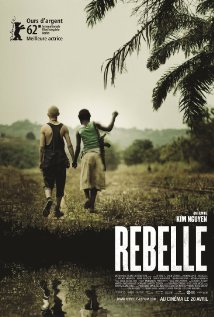Just the Wind (2012)
Director: Benedek Fliegauf
Country: Hungary
Runtime: 86 min
Benedek Fliegauf's hard-hitting Hungarian drama Just the Wind (Csak a szél, 2011) is a chilling story of a Romany community living amongst an atmosphere of fear and paranoia, that will certainly find itself fighting amongst the best of the Berlinale for its prestigious Golden Bear award.
A recent spate of murders has left the Hungarian gypsy community that lone mother Mari (Katalin Toldi) lives within in a state of justifiable panic. Nobody knows who committed these crimes, yet it remains clear that its perpetrators are trying to send out a message. She fears for the well being of her two children and their grandfather - working two jobs a day in order to raise enough money for them to join her husband in Canada. Her children attend the local school but the recent murder of a Romany family, who both worked and sent their children to be educated nearby, shows that these recent hate crimes aren't just aimed at those traveling families who choose not to contribute to society. The heightened sense of terror surrounding these racist attacks has a dramatic effect on the family, with every sound and unusual occurrence culminating in a suffocating sense of trepidation.
Based on tragic real life events, Just the Wind is a drama which focuses on the harrowing effects of these hate crimes without ever attempting to make a misguided social political statement - a fact made clear by all of its ethnic groups being portrayed through the same unapologetic light. However, despite its aim to remain purely a dramatisation it's powerful approach does raise some important issues regarding this often overlooked form of racism.
Director Fliegauf presents his central characters almost like ghosts, observing them as they go about their lives and revealing how invisible they appear to the world which surrounds them - emphasising their ethnic groups neglected social status. Fliegauf allows the camera to cling to his protagonists, imprisoning the audience in their insular community and installing in the viewer an artificial fear of the world which surrounds them, suitably mirroring Mari and her family's own sense of heightened paranoia - an element only amplified by the film's ominous score which installs a palpable sense of foreboding doom.
Steadily building to a nerve shattering conclusion, Just the Wind is a pressure cooker of social criticism which deceptively hooks you early on, before slowly reeling you in for the kill.
Director: Benedek Fliegauf
Country: Hungary
Runtime: 86 min
Benedek Fliegauf's hard-hitting Hungarian drama Just the Wind (Csak a szél, 2011) is a chilling story of a Romany community living amongst an atmosphere of fear and paranoia, that will certainly find itself fighting amongst the best of the Berlinale for its prestigious Golden Bear award.
A recent spate of murders has left the Hungarian gypsy community that lone mother Mari (Katalin Toldi) lives within in a state of justifiable panic. Nobody knows who committed these crimes, yet it remains clear that its perpetrators are trying to send out a message. She fears for the well being of her two children and their grandfather - working two jobs a day in order to raise enough money for them to join her husband in Canada. Her children attend the local school but the recent murder of a Romany family, who both worked and sent their children to be educated nearby, shows that these recent hate crimes aren't just aimed at those traveling families who choose not to contribute to society. The heightened sense of terror surrounding these racist attacks has a dramatic effect on the family, with every sound and unusual occurrence culminating in a suffocating sense of trepidation.
Based on tragic real life events, Just the Wind is a drama which focuses on the harrowing effects of these hate crimes without ever attempting to make a misguided social political statement - a fact made clear by all of its ethnic groups being portrayed through the same unapologetic light. However, despite its aim to remain purely a dramatisation it's powerful approach does raise some important issues regarding this often overlooked form of racism.
Director Fliegauf presents his central characters almost like ghosts, observing them as they go about their lives and revealing how invisible they appear to the world which surrounds them - emphasising their ethnic groups neglected social status. Fliegauf allows the camera to cling to his protagonists, imprisoning the audience in their insular community and installing in the viewer an artificial fear of the world which surrounds them, suitably mirroring Mari and her family's own sense of heightened paranoia - an element only amplified by the film's ominous score which installs a palpable sense of foreboding doom.
Steadily building to a nerve shattering conclusion, Just the Wind is a pressure cooker of social criticism which deceptively hooks you early on, before slowly reeling you in for the kill.



















